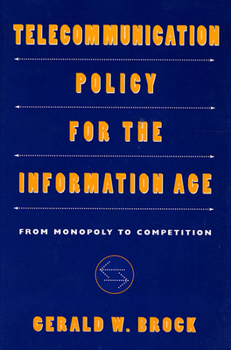Telecommunication Policy for the Information Age: From Monopoly to Competition
Select Format
Select Condition 
Book Overview
Will the rush of the information superhighway leave US telecommunication policy in the dust - or will US policy keep pace with and effectively regulate the future of telecommunication? Former FCC... This description may be from another edition of this product.
Format:Paperback
Language:English
ISBN:0674873262
ISBN13:9780674873261
Release Date:September 1998
Publisher:Harvard University Press
Length:336 Pages
Weight:1.05 lbs.
Dimensions:0.7" x 6.1" x 9.1"
Customer Reviews
1 rating
Telecommunications Regulation - history, theory, & practice
Published by Thriftbooks.com User , 23 years ago
First, note that the rapid change of telecommunications technology and regulations makes it virtually impossible to keep a book fully up-to-date. Brock's book brings us up to 1994, and there have been significant changes since then. This immediately noticeable shortcoming is true with every book in this field, so we will not address it further.Brock paints a very readable and generally clear idea of telecommunications regulation, starting with a few chapters on theory. The philosophical underpinnings of regulation are of some interest, but we know that regulators do not study philosophy before making decisions. The concept that the U.S. system is set up so that there are many "regulators" often acting at cross purposes is an amazing one, given the incredible success of telecommunications in the U.S. The idea that such a successful system could appear so chaotic is worth noting, and Brock is the first author I have seen that praises the current system.Brock's presentation of history to about 1980 is just wonderful. You will gain a real feeling for why the U.S. system operates the way it does.Information after 1980 is not presented as clearly. In part, I think this is because Brock personally remembers what happened then, and has difficulty editing out the less significant events of that period.Overall, the reader is advised to develop a timeline of events to reduce confusion. Brock should include one, but does not.Brock also addresses in a very limited fashion how things should work with data traffic greater than voice traffic. It was easier to get away with that in 1994 when data traffic was still much less than voice traffic, but impossible to avoid seven years later in 2001.With all that said, there is no book that presents this information more clearly. It just needs some editing of events from 1980 to 1994, an update into the 21st century, a timeline, and more consideration of regulations for data traffic.





